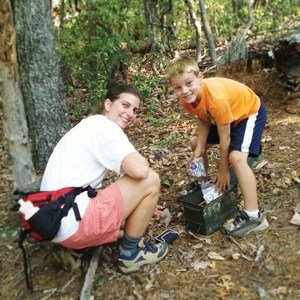 Alex Bryant was an avid gamer who spent most of his free time in front of the computer.
Alex Bryant was an avid gamer who spent most of his free time in front of the computer.
It drove his mother nuts.
“He wasn’t an outdoorsy kind of guy,” said Sabrina Jones, a Chesterfield County mother of four. “I wanted him to get out of the house more. I wanted him to be more active, but I wasn’t sure how to go about it.”
She found her answer eight years ago while reading Better Homes & Gardens. The magazine featured a story on geocaching, and Jones was intrigued.More importantly, Alex got hooked and gave up his computer for a new, more engaging hobby.
Geocaching is a high-tech game of hide and seek similar to letterboxing, which uses clues and references to landmarks to lead players to small, hidden containers in remote areas.While letterboxing has been around for 150 years, geocaching dates to about 2000, when the Global Positioning System (GPS) became widely available.
GPS allows for improved accuracy in finding small containers, called geocaches or caches. These caches come in all sizes imaginable, from microcaches (small metal tubes) to Tupperware containers and ammunition boxes.
“It really is pretty cool,” said Alex, now 18. “I like going to new places, and I really enjoy the people who do it. I’ve made some great friends.”
Geocaches are currently in more than 100 countries around the world, with more than 1.2 million active caches published.
“I call it a hobby for nerds,” said Rory Sturm with a laugh. “I say that because it uses technology. But really, it’s a great activity for the entire family. It’s a chance to get outside and have some fun.”
A resident of Colonial Heights, Sturm started geocaching with his wife, Beth, and 12-year-old daughter, Cheyenne, seven years ago after ordering a GPS for his sailboat. Inside the instructional manual was information about geocaching.
“I like going to cool places and seeing cool things,” said Cheyenne, who has found about 800 caches, including some in Italy. “It’s exciting to try to find something. It makes me feel good to know I was successful.”
Getting started is easy. Just go to geocaching.com and register for free.Type in your address, zip code or locality to bring up caches in your area. Each listing tells you when the cache was hidden and when it was last found. It also ranks its difficulty, based on a number of factors, including terrain. Some of the most difficult caches, for example, require scuba gear.
Most, however, are on dry land. You can download the latitude and longitude and begin your hunt. Caches are often in hollowed-out stumps, hanging on fence posts, under logs and rocks, or in trees.Caches contain a log book for successful hunters to sign and toys or trinkets to trade. Hunters then log back onto the website to record their success (or failure). Many share a personal story About the adventure.
“Some people are into the technical part of it, and others are into the outdoors part of it,” said Jan Dalby, a resident of Henrico’s West End. “I love it all.”
Dalby, a nurse practitioner, began geocaching two years ago – quite by accident. She was at a Henrico County park training one of her dogs how to track, but instead of locating the scented rag, the dog found a cache. A few weeks later she and her husband, Paul, were at Bass Pro Shops and stumbled upon a class on geocaching. After listening in, they decided to purchase a GPS. The couple has since found 190 caches.
“I have discovered parts of Richmond I never knew existed,” Dalby said. “I’ve had so much fun that I’ve introduced it to co-workers.”
Those who hide geocaches often place them in locations special to them. Once they find the perfect location, they upload the coordinates to the geocaching website.
When hiding caches, first get permission from landowners. Most public places, like parks, allow geocaching. Some will even rent you a GPS for the day. Before hiding your first cache, read the guidelines posted on the geocaching website.
“As long as you are not intrusive to the environment, it’s a great thing,” said Tesha Davis, spokesperson for Richmond’s Department of Parks, Recreation and Community Facilities. “No digging, no littering and no glass. As long as there is no harm to the physical space, we encourage people to come out and hide their caches.”
While some caches are relatively simple, others can be quite complicated.Puzzle caches, for example, require players to solve puzzles before getting the coordinates. Other caches are a series of hunts that lead to the final treasure.
“Geocaching is limitless,” said Jones, who has found about 1,300 caches and hidden another 80 with her son, Alex, as well as friends. “It goes as far as your imagination.”
Geocaching can take hunters to parks, cemeteries, islands, gardens, boat landings, beaches, college campuses and more. It can lure them to beautiful countryside and teach them about facilities they’ve never heard of.
But most of all, it can bring families together.
“I know it has been a great bonding experience for me and my mom,” Alex Bryant said. “We’ve made a lot of memories together.”



